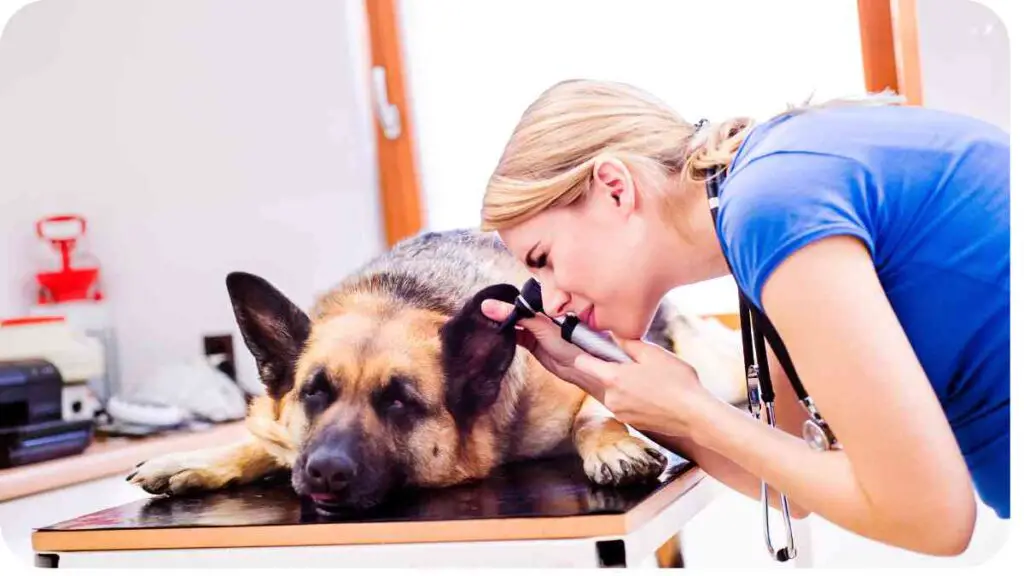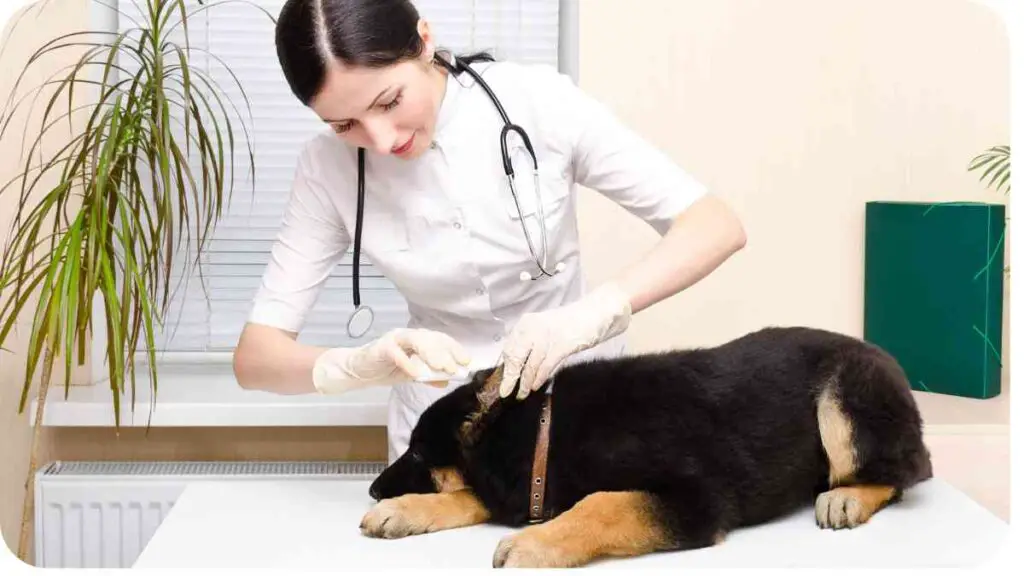German Shepherds are renowned for their intelligence, loyalty, and distinctive physical features, including their expressive ears. If you’re a proud owner of one of these majestic dogs, you may have observed your furry friend engaging in ear-flapping behavior from time to time.
But what exactly does it mean when your German Shepherd starts to flap its ears? In this article, we’ll delve into the various reasons behind this behavior and explore how you can ensure your furry companion’s ear health and happiness.
| Takeaways |
|---|
| 1. German Shepherds may flap their ears for various reasons, including temperature regulation, communication, and enjoyment. |
| 2. Persistent or excessive ear-flapping could indicate underlying health issues or behavioral concerns. |
| 3. Regular ear inspections and veterinary consultations are essential for maintaining your German Shepherd’s ear health. |
| 4. Addressing potential triggers and providing mental and physical stimulation can help manage ear-flapping behavior. |
| 5. Proper ear hygiene and proactive care are key to ensuring your German Shepherd’s overall well-being and happiness. |
2. Understanding German Shepherd Ears

German Shepherds possess ears that are erect and highly mobile, capable of conveying a range of emotions and reactions. Understanding the typical movements and positions of their ears can provide valuable insights into their state of mind and well-being.
When wondering about ear hygiene, Can German Shepherds Get Their Ears Wet? is essential reading. Proper care ensures your furry friend’s ears stay healthy and free from infections. Learn how to maintain cleanliness without harming your German Shepherd’s ears.
Table: Common Ear Movements in German Shepherds
| Ear Movement | Description |
|---|---|
| Forward | Indicates attentiveness or curiosity |
| Erect | Signifies alertness or excitement |
| Flattened | Suggests fear, submission, or anxiety |
| Sideways | Can indicate aggression or discomfort |
Understanding these nuances can help you decipher your German Shepherd’s mood and intentions more effectively.
3. Reasons Why German Shepherds Flap Their Ears
While ear-flapping behavior in German Shepherds may seem innocuous, it can stem from various underlying reasons, ranging from natural instincts to potential health issues.
For a comprehensive understanding of your pet’s lifespan, explore How Long Do German Shepherds Live. Learn about factors influencing longevity and potential health issues, including those affecting ears. Equipped with this knowledge, you can ensure a fulfilling life for your beloved German Shepherd.
Table: Common Reasons for Ear Flapping
| Reason | Description |
|---|---|
| Temperature regulation | Flapping ears can help regulate body temperature, especially in warmer climates or during exercise. |
| Irritation or discomfort | Presence of foreign objects, allergies, or ear infections may prompt ear-flapping as a response. |
| Communication | German Shepherds may use ear movements to communicate with other dogs or their human companions. |
| Anxiety or stress | High levels of anxiety or stress can manifest in repetitive behaviors like ear-flapping. |
| Enjoyment or excitement | Sometimes, ear-flapping is simply a sign of joy or excitement, especially during playtime. |
Understanding the underlying cause of your German Shepherd’s ear-flapping behavior is crucial for addressing it effectively and ensuring your pet’s well-being.
4. Health Issues Related to Ear Flapping
While occasional ear-flapping may be harmless, persistent or excessive flapping could be indicative of underlying health issues that require attention. As a responsible pet owner, it’s essential to be aware of these potential health concerns.
Understanding your German Shepherd’s sensitivities, like Noises German Shepherds Hate, aids in providing a comfortable environment. Discovering and avoiding triggers can reduce stress and prevent potential ear-related issues in your loyal companion.
Table: Health Conditions Associated with Ear Flapping
| Health Condition | Description |
|---|---|
| Ear infections | Bacterial or yeast infections in the ear canal can cause discomfort and lead to ear-flapping. |
| Allergies | Allergic reactions to food, pollen, or environmental factors may result in ear irritation. |
| Ear mites | Infestations of ear mites can cause intense itching and irritation, prompting ear-flapping. |
| Foreign objects | Presence of foreign objects, such as grass seeds or debris, in the ear can cause discomfort. |
| Structural abnormalities | Certain structural issues in the ear, such as hematomas or polyps, may lead to ear-flapping. |
Regular veterinary check-ups and prompt attention to any signs of discomfort or unusual behavior can help identify and address potential health issues before they escalate.
5. Behavioral Factors Influencing Ear Flapping

In addition to physiological reasons, behavioral factors can also influence why German Shepherds flap their ears. Understanding these triggers can help you better address and manage your furry friend’s behavior.
Table: Behavioral Triggers for Ear Flapping
| Behavioral Trigger | Description |
|---|---|
| Excitement | German Shepherds may flap their ears when excited, such as during playtime or when anticipating a reward. |
| Stress or anxiety | High-stress situations, such as loud noises or unfamiliar environments, can lead to ear-flapping behaviors. |
| Attention-seeking | Some German Shepherds may flap their ears to garner attention from their owners or other household members. |
| Boredom | Lack of mental stimulation or physical activity may result in repetitive behaviors like ear-flapping. |
| Comfort or relaxation | In some cases, ear-flapping may be a sign of comfort or relaxation, especially during rest or nap times. |
By identifying the specific triggers that prompt ear-flapping in your German Shepherd, you can implement appropriate strategies to address and manage their behavior effectively.
6. How to Address Ear Flapping in German Shepherds

Addressing ear-flapping behavior in German Shepherds requires a multifaceted approach that considers both physiological and behavioral factors. Here are some tips to help you manage and alleviate this behavior in your furry companion:
Grooming plays a vital role in your German Shepherd’s Health. Learn about the rate of hair growth and its implications for overall maintenance, including ear care. Regular grooming routines contribute to your pet’s well-being and happiness.
Table: Tips for Managing Ear Flapping
| Tip | Description |
|---|---|
| Regular ear inspections | Conduct regular inspections of your German Shepherd’s ears to check for signs of irritation, infection, or foreign objects. |
| Consult with a veterinarian | If you notice persistent ear-flapping or signs of discomfort, consult with your veterinarian to rule out any underlying health issues. |
| Maintain proper ear hygiene | Keep your German Shepherd’s ears clean and dry to reduce the risk of infections or irritation. |
| Address underlying stressors | Identify and address any potential stressors or triggers in your dog’s environment that may be contributing to ear-flapping behavior. |
| Provide mental and physical stimulation | Engage your German Shepherd in regular exercise, play, and mental stimulation to prevent boredom and reduce anxiety. |
| Reward calm behavior | Reinforce calm and relaxed behavior in your German Shepherd with positive reinforcement techniques and rewards. |
By implementing these strategies and maintaining a proactive approach to your German Shepherd’s ear health and well-being, you can effectively manage and reduce ear-flapping behavior.
Addressing behavioral concerns, such as Biting in German Shepherds, promotes a harmonious relationship. Understanding the causes behind biting behavior and implementing effective training techniques fosters trust and reduces instances of stress-related ear flapping.
7. Conclusion
Understanding why your German Shepherd flaps its ears is essential for ensuring its overall health and well-being. While occasional ear-flapping may be harmless and natural, persistent or excessive flapping could indicate underlying health issues or behavioral concerns that require attention.
By observing your dog’s ear movements, addressing potential triggers, and maintaining proper ear hygiene, you can help prevent discomfort and ensure your furry friend’s happiness. Remember to consult with your veterinarian if you have any concerns about your German Shepherd’s ear health or behavior.
With proper care and attention, you can foster a strong bond with your German Shepherd and provide it with a happy and fulfilling life.
8. Frequently Asked Questions (FAQs)
Q: Is it normal for German Shepherds to flap their ears?
A: Yes, it’s normal for German Shepherds to flap their ears occasionally as a natural behavior. However, excessive or persistent ear-flapping may indicate underlying health issues or behavioral concerns.
Q: How can I tell if my German Shepherd’s ear-flapping is a sign of a health problem?
A: If you notice persistent ear-flapping, signs of discomfort, discharge, or unusual odor from your German Shepherd’s ears, it’s essential to consult with your veterinarian for a thorough examination and proper diagnosis.
Q: Can ear infections cause ear-flapping in German Shepherds?
A: Yes, ear infections are a common cause of ear-flapping in German Shepherds. Bacterial or yeast infections in the ear canal can lead to irritation, itching, and discomfort, prompting your dog to flap its ears.
Q: How often should I clean my German Shepherd’s ears?
A: It’s recommended to clean your German Shepherd’s ears regularly, but the frequency may vary depending on your dog’s individual needs and susceptibility to ear issues. Consult with your veterinarian for specific recommendations.
Q: Are there any preventive measures I can take to reduce the risk of ear problems in my German Shepherd?
A: Maintaining proper ear hygiene, providing regular veterinary check-ups, and addressing potential triggers for ear-flapping, such as allergies or stress, can help reduce the risk of ear problems in your German Shepherd.
These frequently asked questions can provide additional insights into managing your German Shepherd’s ear health and behavior effectively. If you have any further concerns or inquiries, don’t hesitate to reach out to your veterinarian for personalized guidance and advice.

I’m Dr. Hellen James, I’ve spent my career working with dogs, and I’ve seen first-hand how important it is to understand the individual needs of each breed. I want to share my knowledge of dog breeds with you so that you can make informed decisions about which dog will be best for your household and lifestyle.

